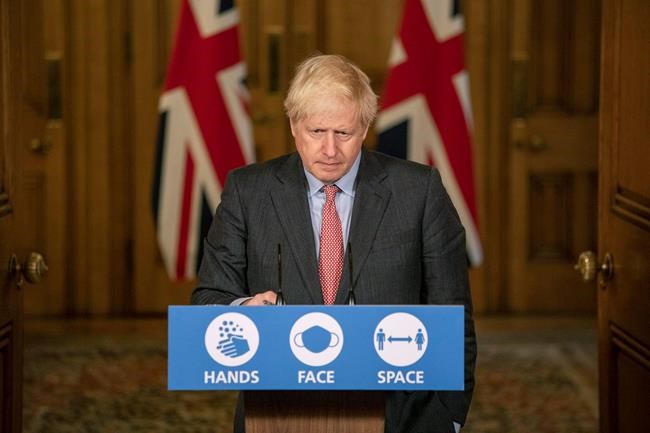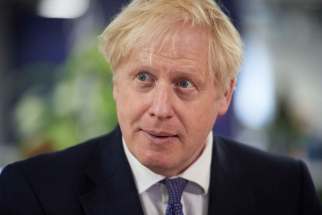Johnson facing impossible Brexit deadline
Read this article for free:
or
Already have an account? Log in here »
To continue reading, please subscribe:
Monthly Digital Subscription
$0 for the first 4 weeks*
- Enjoy unlimited reading on winnipegfreepress.com
- Read the E-Edition, our digital replica newspaper
- Access News Break, our award-winning app
- Play interactive puzzles
*No charge for 4 weeks then price increases to the regular rate of $19.00 plus GST every four weeks. Offer available to new and qualified returning subscribers only. Cancel any time.
Monthly Digital Subscription
$4.75/week*
- Enjoy unlimited reading on winnipegfreepress.com
- Read the E-Edition, our digital replica newspaper
- Access News Break, our award-winning app
- Play interactive puzzles
*Billed as $19 plus GST every four weeks. Cancel any time.
To continue reading, please subscribe:
Add Free Press access to your Brandon Sun subscription for only an additional
$1 for the first 4 weeks*
*Your next subscription payment will increase by $1.00 and you will be charged $16.99 plus GST for four weeks. After four weeks, your payment will increase to $23.99 plus GST every four weeks.
Read unlimited articles for free today:
or
Already have an account? Log in here »
Hey there, time traveller!
This article was published 06/10/2020 (1889 days ago), so information in it may no longer be current.
Four years after the Brexit referendum, the British government has still not figured out how to extract Britain from the European Union. The two sides are still trying to reach a trade agreement. If they don’t, the current trade rules will expire on Dec. 31. No one actually knows what rules would then apply on New Year’s Day.
The time to reach an agreement is actually shorter than that. The 27-member EU needs a couple of months for all its member states to ratify any treaty that is negotiated. British Prime Minister Boris Johnson, however, has been saying that the practical deadline is the end of next week: if Britain and the EU have not reached a trade agreement at that point, according to Mr. Johnson, then two sides should forget about reaching an agreement and go their separate ways.
That cannot, however, be an end of the matter. Britain and the EU are each other’s largest trade partners. History, geography and established commercial relationships tie them tightly together. Even if they go, in some sense, their separate ways, those separate ways will be more like distinct lanes on a single highway.
People in UK fishing ports voted to leave the EU because they wanted to get foreign fishing boats out of UK waters. Loss of those fishing rights would, however, be ruinous for some European fishing fleets. To avoid open war on the fishing grounds, some kind of agreement must be found about who will fish where.
UK industry, hard hit already by both the COVID-19 epidemic and the threatened loss of EU market access, may need heavy state subsidies to recover its previous levels of output and employment. The EU, however, is unwilling to let the UK flood the continent with state-subsidized products and services. An agreement on levels of state support of industry has yet to be reached.
Mr. Johnson’s government agreed a year ago that EU product safety rules would continue to apply in Northern Ireland. Goods shipped from England to Northern Ireland could be subject to customs inspection and EU customs duties. This year, however, Parliament approved the government’s bill allowing it to renege on that agreement. The Irish dimension of withdrawal, therefore, is once again up in the air.

A last-minute papering-over of these disagreements is always possible. With or without an agreement, however, the underlying issues are likely to continue. Northern Ireland will be pulled closer to the Irish Republic, to the dissatisfaction of unionists, and will also be held within the United Kingdom, to the displeasure of nationalists. The danger of re-opening the nightmare years of communal violence in Ireland is ever-present. Fishing rights in British waters will either be changed, angering continental fishers, or not, angering the British fleets.
Mr. Johnson has often said he would like a trade agreement similar to Canada’s Comprehensive Economic and Trade Agreement with the EU, which was negotiated starting in 2009 and began taking effect in 2017. That sounds like a simple solution to a complex problem.
If there were no fish, no Ireland and no dense web of commercial ties across the English Channel, Mr. Johnson might realistically hope for a solution in a mere eight years. In the world we have, however, the work of extracting Britain from Europe will probably continue long past the end of this year.









